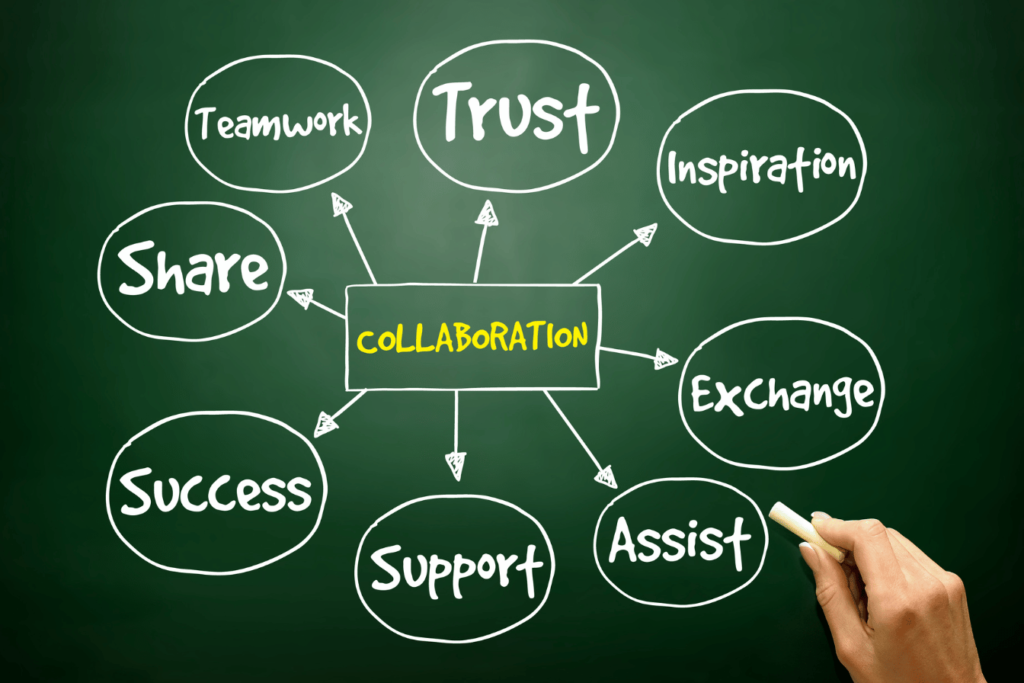In a world that’s interconnected and interdependent, collaboration is not just a choice; it’s a necessity. Collaboration enables individuals and groups to achieve outcomes that are greater than the sum of their parts, leading to innovation, resilience, and sustainable progress. In a world that’s increasingly interconnected and interdependent, collaboration is not just desirable; it’s imperative. By collaborating to win, we can create a brighter, more inclusive future for all.Collaboration is more than just working together; it’s about synergizing efforts, leveraging diverse strengths, and achieving collective goals.

To collaborate effectively, individuals and teams must navigate complex dynamics while fostering an environment of trust, communication, and mutual respect. Here are key strategies for mastering effective collaboration:
- Establish Clear Goals and Expectations:
- Define the purpose and objectives of collaboration upfront.
- Clarify roles, responsibilities, and timelines for each team member.
- Ensure alignment around common goals to maintain focus and direction.
- Foster Open Communication:
- Encourage transparent and honest communication among team members.
- Actively listen to others’ perspectives and ideas without judgment.
- Provide regular updates and feedback to keep everyone informed and engaged.
- Build Trust and Psychological Safety:
- Cultivate an environment where team members feel safe to express themselves.
- Lead by example and demonstrate integrity, reliability, and respect.
- Address conflicts and issues openly and constructively to build trust over time.
- Embrace Diversity and Inclusion:
- Value and leverage diverse backgrounds, experiences, and perspectives.
- Create opportunities for everyone to contribute and participate actively.
- Foster a culture of respect, empathy, and appreciation for differences.
- Promote Accountability and Ownership:
- Hold each team member accountable for their commitments and contributions.
- Encourage autonomy and empower individuals to take ownership of their work.
- Celebrate achievements and milestones collectively to reinforce a sense of accomplishment.
- Facilitate Effective Meetings and Workshops:
- Plan and structure meetings with clear agendas and objectives.
- Allocate time for brainstorming, problem-solving, and decision-making.
- Assign roles such as facilitator, timekeeper, and note-taker to ensure efficiency.
- Cultivate a Culture of Collaboration:
- Lead by example and demonstrate a collaborative mindset in your actions and interactions.
- Recognize and reward teamwork, innovation, and collaboration.
- Foster cross-functional collaboration and partnerships across departments or organizations.
- Emphasize Flexibility and Adaptability:
- Be open to new ideas, feedback, and changes in direction.
- Adapt to evolving circumstances and challenges with resilience and agility.
- Encourage experimentation and learning from both successes and failures.
- Promote Continuous Improvement:
- Reflect on past collaboration experiences to identify lessons learned and areas for improvement.
- Solicit feedback from team members and stakeholders to assess effectiveness and identify opportunities for growth.
- Iterate and refine collaboration processes and practices based on feedback and insights gained.
- Celebrate Success and Learn from Failure:
- Acknowledge and celebrate achievements, milestones, and successes collectively.
- Embrace failure as an opportunity for learning and growth, rather than as a setback.
- Foster a culture of continuous improvement by sharing insights and lessons learned from both successes and failures.
- Encourage a Healthy Work-Life Balance:
- Respect boundaries and prioritize well-being to prevent burnout and foster long-term collaboration.
- Encourage flexible working arrangements and support initiatives that promote work-life balance.
- Foster a supportive and inclusive culture that values the holistic well-being of team members.
- Encourage Collaboration Tools and Technology:
- Utilize digital platforms and tools for seamless communication and collaboration.
- Implement project management software to track progress, manage tasks, and share resources.
- Leverage virtual collaboration tools for remote teams to bridge geographical barriers.
By implementing these strategies, individuals and teams can cultivate a culture of effective collaboration that drives innovation, fosters inclusivity, and achieves collective success. Collaboration is not just about working together; it’s about creating synergy, unlocking potential, and achieving more together than we ever could alone.
Colaboratory.in is one of the tools one can use for finding the right collaborator for their endeavours. All you need to do is just post your projects or start-up business ideas or creative pursuits or even student projects on colaboratory.in. We will ensure to get the word out about your project or start-up to as many individuals as possible so that they can reach out to you. You can then connect with them and explore synergies and implement above strategies for a successful collaboration.
Colaboratory.in is a free to use platform and open for all and for any kind of projects. Post your projects today and start collaborating to ensure your success!



Pingback: Why Collaborate? - Your Path to Success! - Collaborate to Win